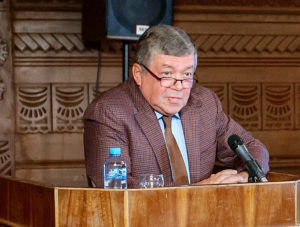 Ruslan Grinberg
Ruslan Grinberg
Research Director of the Institute of Economics of the Russian Academy of Science, Corresponding Member of the Russian Academy of Science, Vice-President of the VEO of Russia
Financial capital turned from a servant into a master. And I must say that this phenomenon has spread so widely around the world that we can even talk about the emergence and consolidation of what may be called the global financial nomenklatura. From the United States to China, there are forces that are interested in maintaining the status quo and the domination of financial capital. Usually, I don’t fancy conspiracy theories. In addition to the English word “conspiracy”, there’s another word, “stupidity”, so – a stupidity theory. It seems to me, this theory is more suitable for explaining the phenomena that occur both in Russia and abroad.
It is a separate issue, but nevertheless it is important to realize that this nomenklatura arose quite naturally, and it’s very important because it’s very difficult to even start fighting against it. It would seem that the 2008-2009 crisis clearly showed that the culture of irresponsible lending, the credit crunch which began with the United States mortgage crisis, fully proved that the domination of finance capital had no future whatsoever. But somehow nothing came out of it. A few people went to prison, and some people greatly profited from the crisis, but everything remained more or less the same. Many people, leftists, rightists, and centrists alike, feel that the financial bubble is being inflated again. And it seems that the system of incentives, leading to the inflation of the financial bubble, is still in place. There are all sorts of suggestions as to how to curb it: proposals have been made by academic scientists which are of little significance in the modern world.
As regards the role of money in the modern world, my favorite aphorism is as follows: “Money is the root of all evil, but the same is true for the lack thereof”. And I also like another one, I don’t remember whether I came up with it myself or read it somewhere, «Money does not bring happiness, but it helps a lot when there is no happiness.» And there is yet another aphorism by Goethe: “Health is not all-important. But without health, nothing is important.” The same thing can be said about money. It doesn’t bring happiness but it’s hard to live without it too. When is money good, and when is it evil?
It is believed that money and the wheel are mankind’s two great inventions. This is true. Why is money good? First, it facilitates the exchange of goods, but people who came up with money never thought money would turn from being an aid into an instrument of domination and a major all-important boon. It is a very important point.
The second important point is the redistribution of money. When it is needed in a certain area but is absent from it, there is credit. It is an amazing achievement of humanity, and throughout the 20th century economic growth was largely determined by the development of credit.
And the third point, which I would like to emphasize, is the concept of financial boost promoted by our colleagues Yakov Mirkin and Sergey Bodrunov, in respect of which I would allow myself to offer a light criticism. Generally speaking, in the context of this point number three, money is very good for reviving the economy. And there is every indication that the time is finally ripe for such a revival. Why is it so? The economy has been stagnant for 10 years. Even in earlier years, if you look at the average indicators and exclude the years of the rapid growth in oil prices, the economy grew by approximately 0.8% per year over the last quarter of a century. If at the time the Russians were renouncing socialism they were told that in 25 years the growth rate would be less than 1% per year, it would have been a big scandal for the politicians who led us to the bright future.
So what does money mean today for our economy? There is a dispute between two schools of thought. One of them is led by Aleksey Leonidovich Kudrin, a liberal economist, whether he belongs to the system or not. This school believes that everything is very simple: Russia has a really bad investment climate, it’s bad we had a falling out with the West, no matter who is to blame, and it’s too bad we don’t have good projects. So, what is to be done? We must strive to improve the investment climate. We’ve been hearing it for a quarter of a century. You might ask Alexei Leonidovich: what stopped you from taking care of the investment climate earlier? Today we see a picture that’s quite shameful for a developed country: nearly 20 million people are not included in the statistics. They work, get paid, their children are somehow being educated but no one knows about them. If you multiply these 20 million by three (add wives or husbands and children), how many people will you get? About 60 million. This is just amazing. The question arises, why did it happen? Why is it impossible to bring them from shadows into light? Because everyone is afraid that the economy will grind to a halt as those people have been working in the shadow sector for a reason. So, in order for them to work normally and come out of the shadows, it is necessary to create an investment climate that would show them it’s safe to work in the open.
So, about the boost. It seems easy, as in the developed countries, that if you start throwing money from a helicopter, economic growth will follow, and you don’t even have to use a helicopter but simply lower the interest rate, as many experts suggest. But I am in opposition of the monetary and credit policy and I think that people are right in being afraid of what it may bring.
What happened in our beloved homeland? If, for example, in the US or Germany they need to accelerate economic growth, they start pumping money into the system and it always works. It does not work for us though, because, first, we are too open an economy, second, we are too non-diverse an economy, and, third, the result is absolutely guaranteed: the money will be converted either into imported goods or foreign currency. Therefore, the country has been undecisive about currency controls, it has done nothing to diversify the economy, and has eventually run into a stalemate.
If a boost is at all possible, it must be like a surgical strike, it should be focused, but this will require a choice of priorities that need to be consistently addressed. But as we see today, everyone gets a piece of the pie. It is, of course, much better for preserving the status quo: everybody is more or less happy, everybody gets some money and keeps silent. But there’s no appetite for finance.
I want to cite the most cynical economic aphorism of all times, which was invented here by the Russians: “What is investment? Investment is a failed speculation.” There is a lot of meaning in it. And it is a concise expression of the domination of money.
Now, the three ways in which money is evil.
The first point I’ve made before is: when money is above all, it’s not good.
The second point is the deepening of material inequality. It’s a very important point. Before the 2008–2009 crisis the world was prone to irresponsible lending. Barack Obama called it the culture of irresponsibility. Financial institutions lent money to anyone. Everyone knew it was bound to come to an end, but no one knew when the clock would strike «five to twelve». When boiling water, you can tell the exact moment it will start to boil by measuring the temperature. Today we don’t know when water will start boiling. We know the bubble has started to inflate, but we do not know when it will burst; everyone thinks they will somehow pull through, so it’s difficult to curb this process, and on the other hand the media are engaged in this process too since every media outlet is owned by the financial nomenklatura, and no one wants to give much thought about ways of improving the situation.
The third point, which is the worst, is very important both morally and politically: money is overrated. It is especially important for young people. I believe that the bias towards the neoliberal doctrine (money above all and every man for himself) is absolutely counterproductive for humanity. In Soviet times, when we were young we were uncomfortable talking about money, and it was even dangerous since you were not supposed to openly crave for money; although 90% of the population wanted to be rich, you were supposed to despise money. It was obviously a great folly. But it was not a good reason for rushing to the other extreme: money is everything, pure egoism without any altruism, you are not supposed to think about the public good, you are only supposed to look after yourself, your money, your earnings, at any cost and by any means necessary. Even a good upbringing, if you received one from your parents, is worth nothing since you need to survive in a world like this. And it’s the biggest price the Russians had to pay for the neo-liberal transformation.
The final point: what is to be done? Firstly, it is necessary to introduce taxes on short-term financial transactions. The Nobel laureate James Tobin suggested it, and I guess it’s still relevant. It would be a step forward in ensuring that the country’s finances are in check. The worst thing that happened is the spread of off-shore transactions. If we want to make finances an aid to the growth of the real economy, then, of course, offshore companies should be prohibited in principle since the country’s tax base has shrunk because of the very fact of their existence.






